Daily Vocabulary Words: List of Daily Used Words
Hi there. Welcome to this special section @ Wordpandit.
Our endeavour here is straightforward: highlighting important daily vocabulary words, you would encounter in The Hindu. This is your repository of commonly used words; essentially, we are posting a list of daily used words. Hence, this has significant practical application as it teaches you words that are commonly used in a leading publication such as The Hindu.
Visit the website daily to learn words from The Hindu.
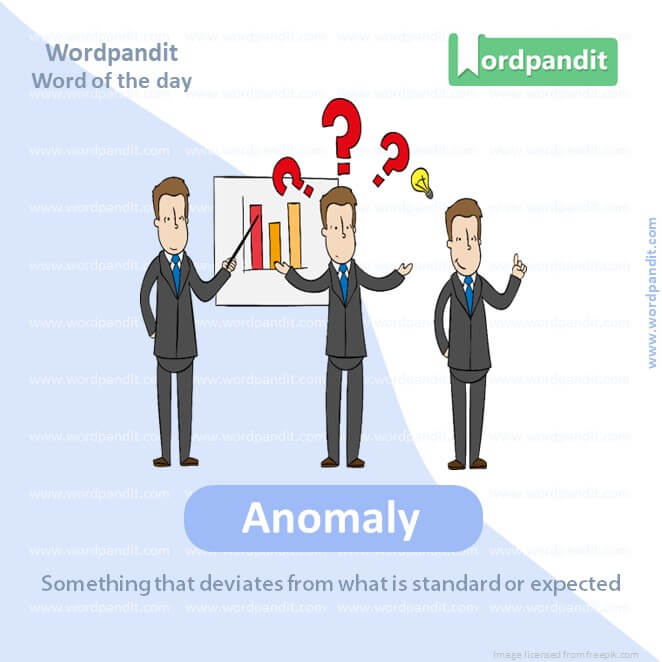
WORD-1: Anomaly
CONTEXT: The Court has corrected this anomaly in the law related to parliamentary privileges by holding that there can be no immunity for a Member of Parliament or a State legislature against a bribery charge in connection with a vote or speech in the legislature.
SOURCE: The Hindu
EXPLANATORY PARAGRAPH: Imagine if you saw a pink cow when all other cows you’ve ever seen were black or brown. That pink cow would be really unusual or different from what is normal—that’s called an “anomaly.”
MEANING: Something that deviates from what is standard or expected
PRONUNCIATION: uh-NOM-uh-lee
SYNONYMS: irregularity, exception, oddity, aberration, peculiarity
USAGE EXAMPLES:
1. The scientist studied the anomaly in the data.
2. A snowstorm in June is an anomaly for the region.
3. The teacher noticed an anomaly in his student’s usual behavior.
4. Finding a warm day in winter is an anomaly.
WORD-2: Foregrounded
CONTEXT: In overruling the majority verdict in P.V. Narasimha Rao vs State (CBI/SPE) (1998), a seven-member Constitution Bench has foregrounded probity as the main aspect of parliamentary functioning.
SOURCE: The Hindu
EXPLANATORY PARAGRAPH: Imagine you’re drawing a picture and you draw a big tree right in the middle where everyone can see it best. You’ve made the tree the most important part of your picture. “Foregrounded” means making something the most noticeable or important part of something.
MEANING: Brought into the most prominent position; made dominant (verb).
PRONUNCIATION: FOHR-ground-ed
SYNONYMS: emphasized, highlighted, accentuated, spotlighted, brought to the forefront
USAGE EXAMPLES:
1. The issue was foregrounded during the debate.
2. She foregrounded the hero’s struggle in her story.
3. Environmental concerns are being increasingly foregrounded in politics.
4. The director foregrounded the conflict between the characters.
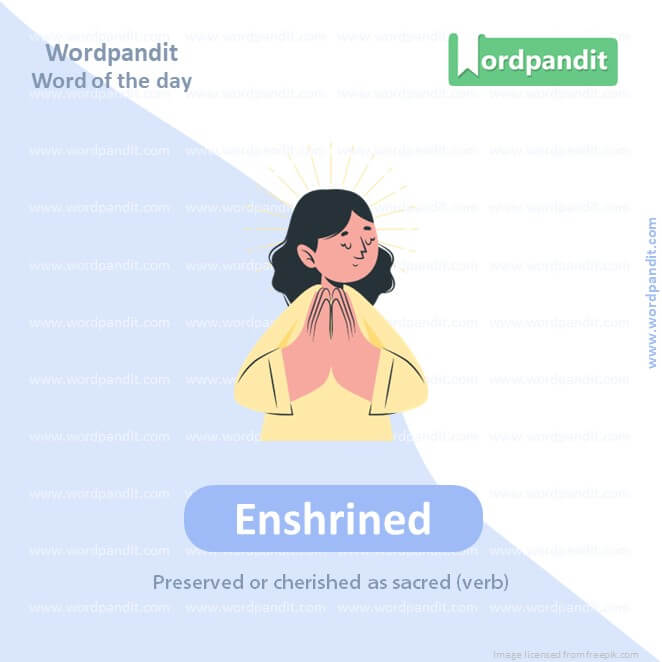
WORD-3: Enshrined
CONTEXT: The Court has made it clear that parliamentary privilege, enshrined in Article 105 (for MPs) and Article 194 (for State legislators) is aimed at protecting the freedom of speech and independence of the legislators in their functioning in the House and cannot extend to bribery
SOURCE: The Hindu
EXPLANATORY PARAGRAPH: Imagine you have a very special trophy and you put it in a glass case so it can be protected and everyone can see it. “Enshrined” means to put something important in a special place so it is respected and protected.
MEANING: Preserved or cherished as sacred (verb).
PRONUNCIATION: en-SHRYND
SYNONYMS: preserved, protected, safeguarded, consecrated, immortalized
USAGE EXAMPLES:
1. The right to free speech is enshrined in the constitution.
2. Her achievements are enshrined in the hall of fame.
3. The artifacts were enshrined in the museum.
4. Traditions are often enshrined in ceremonies.
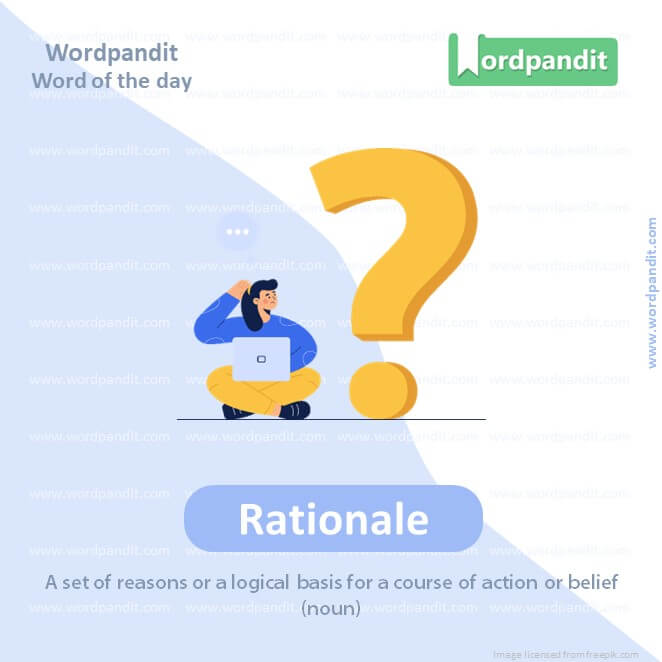
WORD-4: Rationale
CONTEXT: A key rationale that weighed with the Constitution Bench in 1998 was that parliamentary privilege was essential to protecting members from persecution for anything said or any vote in the House.
SOURCE: The Hindu
EXPLANATORY PARAGRAPH: Imagine you want to eat dessert before dinner, and you explain to your parents that it’s because you did all your homework. Your explanation of why you should eat dessert first is like a “rationale.” It’s the reason behind why you do something.
MEANING: A setof reasons or a logical basis for a course of action or belief
(noun)
PRONUNCIATION: rash-uh-NAL
SYNONYMS: reasoning, basis, justification, grounds, explanation
USAGE EXAMPLES:
1. She provided a strong rationale for her decision.
2. The rationale behind the new policy was clear.
3. He asked for the rationale of the project’s approach.
4. The study lacked a clear rationale.
WORD-5: Weighed
CONTEXT: A key rationale that weighed with the Constitution Bench in 1998 was that parliamentary privilege was essential to protecting members from persecution for anything said or any vote in the House.
SOURCE: The Hindu
EXPLANATORY PARAGRAPH: Imagine you have a bag of apples and you use a scale to find out how heavy they are. You are weighing the apples. “Weighed” means to measure how heavy something is or to think carefully about a decision.
MEANING: Assessed the importance, effect, or value of (something) (verb).
PRONUNCIATION: WAYD
SYNONYMS: considered, evaluated, assessed, measured, pondered
USAGE EXAMPLES:
1. She weighed her options before making a choice.
2. The evidence was carefully weighed by the jury.
3. He weighed the fruit at the market.
4. The consequences of the decision were weighed seriously.
WORD-6: Bribery
CONTEXT: the seven-member Bench has concluded that the potential for such misuse is neither enhanced nor diminished by recognising the court’s jurisdiction to prosecute a member for bribery.
SOURCE: The Hindu
EXPLANATORY PARAGRAPH: Imagine someone wants to be the leader in a game, and they give candy to friends so they will choose him as the leader. That’s like “bribery.” It means giving someone something valuable so they will do something you want.
MEANING: The giving or receiving of something of value to influence a person in a position of trust (noun).
PRONUNCIATION: BRY-buh-ree
SYNONYMS: corruption, payola, kickback, inducement, graft
USAGE EXAMPLES:
1. The politician was accused of bribery.
2. Bribery is illegal and unethical.
3. The company faced charges of bribery in foreign markets.
4. He was caught in a bribery scandal.
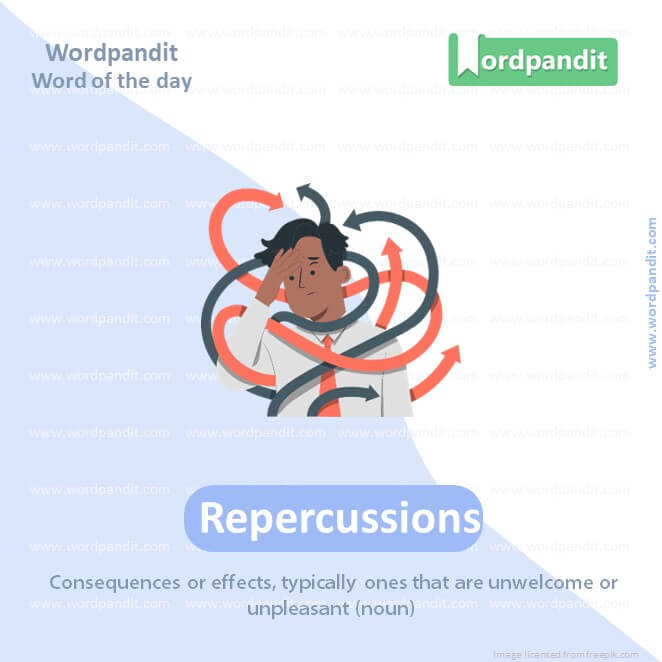
WORD-7: Repercussions
CONTEXT: When civilian groups resort to violence against state actors without repercussions, one has to call into question the maintenance of law and order in the State of Manipur.
SOURCE: The Hindu
EXPLANATORY PARAGRAPH: Imagine you throw a ball really hard against the wall, and it bounces back and breaks a window. The broken window is a result of your action—that’s called a “repercussion.”
MEANING: Consequences or effects, typically ones that are unwelcome or
unpleasant (noun).
PRONUNCIATION: ree-pur-KUH-shunz
SYNONYMS: consequences, effects, outcomes, fallout, ramifications
USAGE EXAMPLES:
1. The decision had serious repercussions for the business.
2. They discussed the potential repercussions of the lawsuit.
3. The financial crisis had repercussions across the globe.
4. His actions at work faced immediate repercussions.
WORD-8: Ethnicised
CONTEXT: The police in the valley are heavily ethnicised with barely any representation from the Kuki-Zo minority.
SOURCE: The Hindu
EXPLANATORY PARAGRAPH: Imagine everyone at school is asked to wear clothes that show where their family comes from, like traditional costumes. When we focus on people’s backgrounds or cultures in this way, it’s called “ethnicised.”
MEANING: Made to relate specifically to ethnicity or ethnic backgrounds (verb).
PRONUNCIATION: ETH-nih-sized
SYNONYMS: racialized, culturally defined, ethnically characterized
USAGE EXAMPLES:
1. The debate became ethnicised, focusing on cultural backgrounds.
2. The policy was criticized for being overly ethnicised.
3. The conflict in the region has been increasingly ethnicised.
4. Literature is often ethnicised to reflect diverse perspectives.
WORD-9: Delegitimisation
CONTEXT: the predominance of extra-legal forces in public life in the valley and the hills points to the delegitimisation of the idea of the state alone having a monopoly over the use of physical force in establishing law and order.
SOURCE: The Hindu
EXPLANATORY PARAGRAPH: Imagine you made a rule in a game that you can only take small steps, but someone said that rule wasn’t fair and shouldn’t count. They are trying to make others believe your rule isn’t good. “Delegitimisation” is making something seem not valid or not important.
MEANING: The act of undermining something’s legitimacy or making it seem unauthorized or unwarranted (noun).
PRONUNCIATION: dee-leh-JIT-ih-my-ZAY-shun
SYNONYMS: discrediting, invalidation, undermining, disparagement, denigration
USAGE EXAMPLES:
1. The campaign involved the delegitimisation of the opponent.
2. The article contributed to the delegitimisation of the study.
3. His comments were seen as an attempt at delegitimisation.
4. Delegitimisation of the government was a tactic used by the rebels.
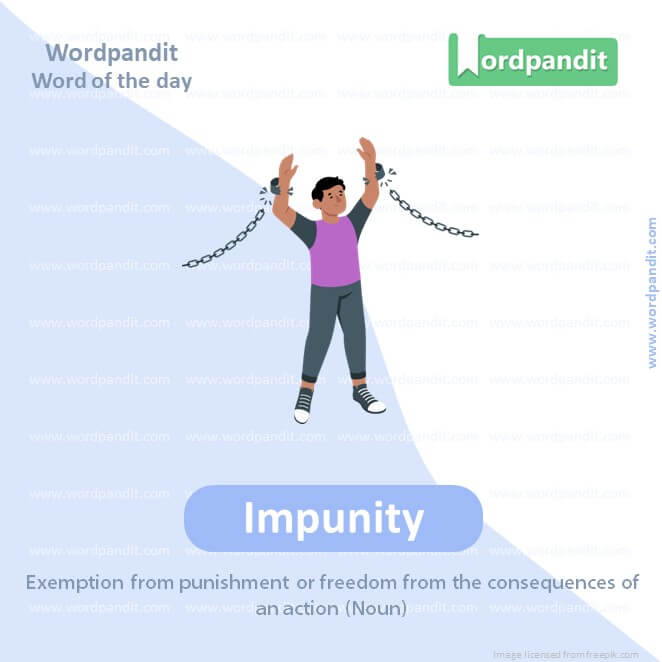
WORD-10: Impunity
CONTEXT: The rampant radicalisation provides an opportunity for the muzzled civic voices in Manipur, and in the valley in particular, to raise their concerns about the impunity enjoyed by such forces.
SOURCE: The Hindu
EXPLANATORY PARAGRAPH: Imagine if you broke a rule, like running in the halls, but didn’t get in trouble at all. When someone does something wrong but doesn’t face any consequences, that’s called “impunity.”
MEANING: Exemption from punishment or freedom from the consequences of
an action (Noun).
PRONUNCIATION: im-PYOO-nih-tee
SYNONYMS: exemption, immunity, freedom, non-liability, privilege
USAGE EXAMPLES:
1. He acted with impunity, knowing he wouldn’t be punished.
2. Corruption thrived because of the impunity enjoyed by officials.
3. The regime was criticized for allowing human rights abuses to occur with impunity.
4. Impunity in cases of financial fraud is a serious concern.
Vocabulary Words for IELTS'
Preparing for an esteemed examination like IELTS urges a diligent focus on ‘vocabulary words for IELTS’. These specific words, frequently prominent in IELTS examinations, play a vital role in expressing ideas effectively and articulately. To successfully conquer ‘vocabulary words for IELTS’, a strategic and focused approach is quintessential.
A fundamental step when learning ‘vocabulary words for IELTS’ is understanding these words in the context of use. For this, exposure to diverse resources like newspapers, journals, academic texts, and digital content is crucial. This engagement aids in understanding the nuances of these words, fortifying your preparation for ‘vocabulary words for IELTS’.
When tackling ‘vocabulary words for IELTS’, regular practice is the cornerstone of success. Consistent writing and speaking exercises help in embedding this vocabulary in your linguistic repertoire. Take situations or topics that commonly appear in the IELTS exam and practice crafting complex yet coherent sentences using these words.
In the journey to unfold ‘vocabulary words for IELTS’, making use of memory-enhancement techniques can orchestrate your success. Tools like flashcards and recall-based applications can significantly assist in retaining and reinforcing these words in your memory. Additionally, forming personal connections or stories with these words can greatly improve word recall.
Brevity is equally significant when preparing for ‘vocabulary words for IELTS’. Attempt to learn a limited number of words each day rather than tackling a large list all at once. This habit allows the brain adequate time to absorb and store these words securely, ensuring an effective learning experience.
In conclusion, the quest to master ‘vocabulary words for IELTS’ is an engaging dance of comprehension, practice, memory techniques, and thoughtful pacing. As you pirouette gracefully through these strategies, you’ll find communicating your IELTS responses with the right ‘vocabulary words for IELTS’ is less of a cliffhanger and more of an epic tale of language success.










